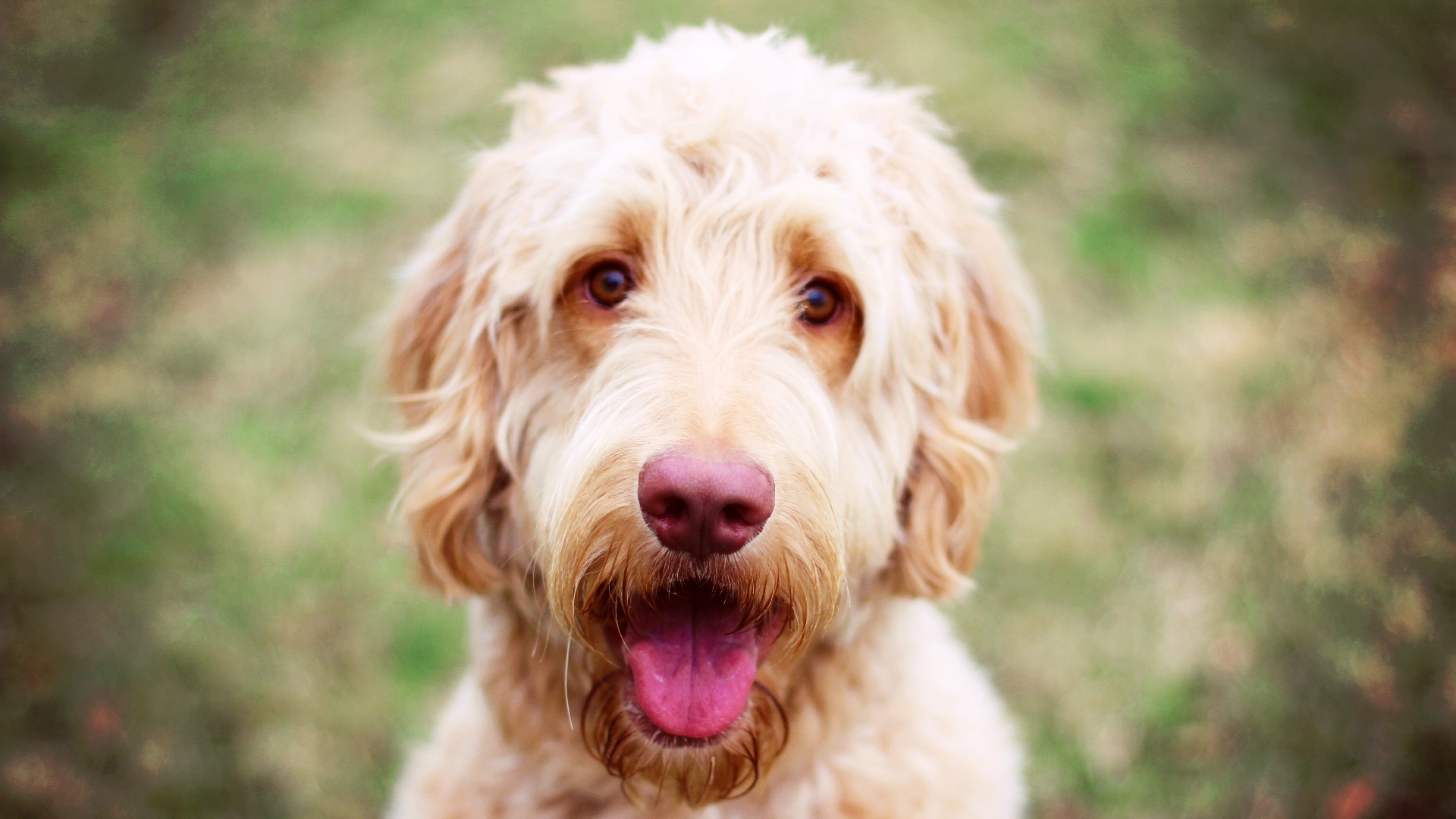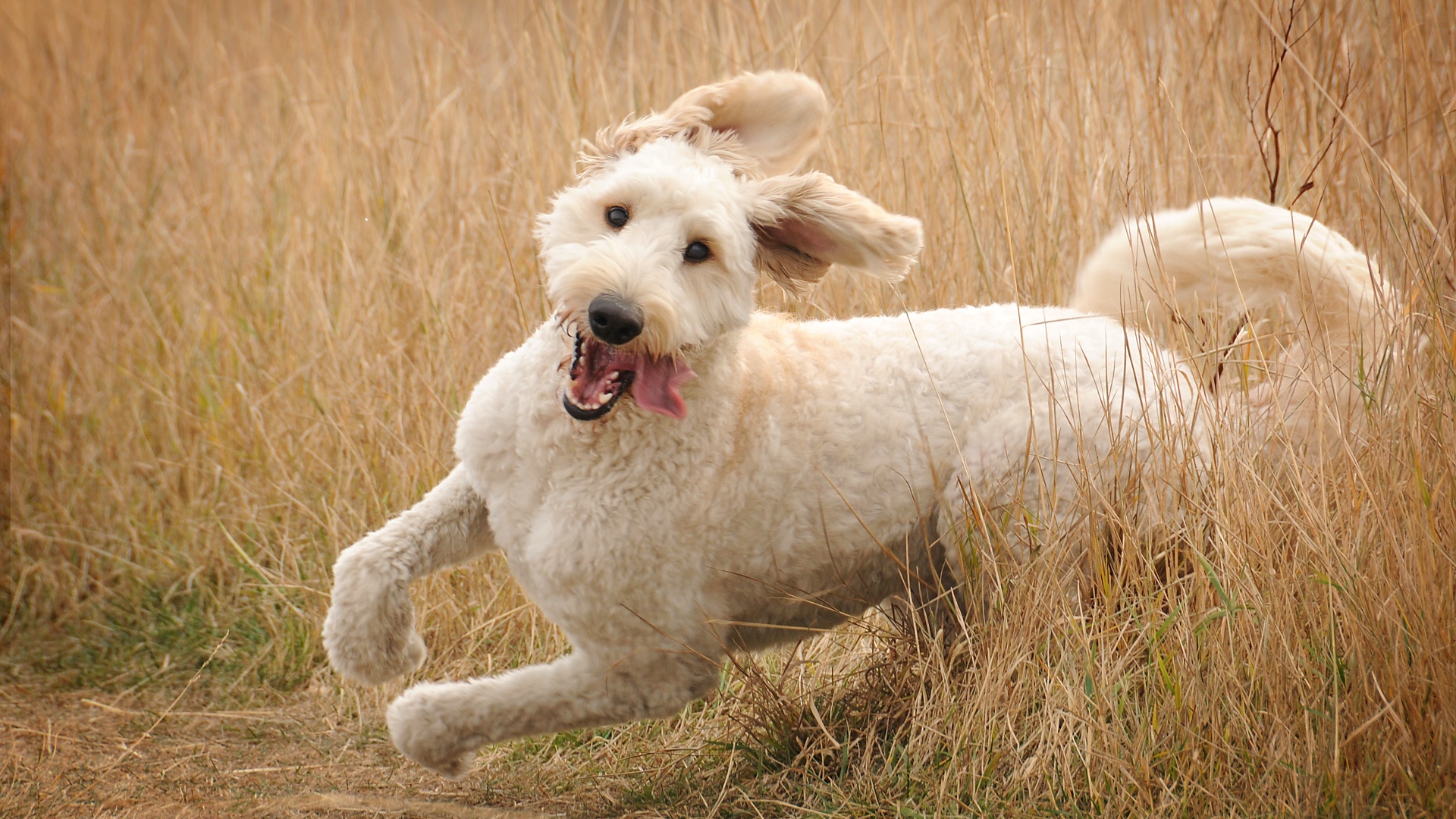Goldendoodle: Breed profile
Part-Poodle, part-Golden Retriever, the Goldendoodle is not only adorable, but playful and smart, making it the perfect family companion

Get the best advice, tips and top tech for your beloved Pets
You are now subscribed
Your newsletter sign-up was successful
Nicknamed the Groodle, Doodle, or Goldenpoo, the Goldendoodle is one of the most recent poodle mixes. While its exact origin hasn’t been determined, the crossbreed first appeared in the US in the 1990s.
Known as a designer breed, the Goldendoodle was bred specifically for the desirable traits of its parent breeds the poodle and the Golden Retriever. These include its cute looks and soft coat, its intelligence and its loveable, friendly, nature.
The Goldendoodle received its name in 1992 and, while it is still not a registered breed, it has grown in popularity ever since. This is no surprise, of course. These dogs make wonderful family dogs thanks to their gentle and affectionate characters and are even used as service and therapy dogs.
They love being around people and are very loyal, but a bit too sociable to make a good guard dog. While they’re happy to curl up on the sofa they also have lots of energy so they’ll need both space and companionship.
Whether you choose a miniature (13-20 inches), small (17-29 inches) or large (20-24 inches) Goldendoodle, read on to find out all about the breed and whether it’s right for you.
How much exercise does a Goldendoodle need?
Life expectancy: 10-15 years
Average weight: Miniature: 15-30lb/7-13kg Standard: 30-45lb/14-20kg+
About the same as: A tyre, a microwave, a small bale of hay
How much exercise your Goldendoodle needs will depend on a number of factors including its age, size and temperament, but these dogs love to move.
Generally they are a moderate energy breed, so will need at least 20-30 minutes of exercise a day, whether that’s taking them for a walk or active play in the garden. However, if they’re young and hyper, they may need more. They love to swim, so this is a great alternative to have some fun while giving them a workout.
Get the best advice, tips and top tech for your beloved Pets
One thing is for sure, the Goldendoodle needs space to exercise so the breed is not well-suited for apartment-dwellers. They need a back garden with lots of space and a secure fence. Just remember, while they love being outdoors, this is an indoor dog that doesn’t like to be left alone for long periods. If you leave them on their own for too much time, they’ll either get bored and become mischievous, or they could even suffer from separation anxiety.
Are Goldendoodles easy to train?
Suitable for: First-time dog owners who want an affectionate, playful family dog
Not suitable for: Anyone who doesn't have the time, space or energy to devote to them
Temperament: Friendly, loving, fun
Shedding: Low
In general, Goldendoodles are easy to train as they are intelligent and eager to please their owners. This makes them a good fit for either first-time or experienced owners.
Puppies will need plenty of socialization (being around people and other dogs) from an early age to avoid becoming shy around strangers, but, with the right training, they usually have friendly temperaments, are obedient and do not show aggressive behaviour.
Positive reinforcement – rewarding good behaviour with treats – works particularly well for Goldendoodles, as well as clicker and crate training.
Both the Goldendoodle’s parent breeds – the poodle and the Golden Retriever – were originally bred to hunt waterfowl, so as hunting dogs they are both intelligent and focused – qualities Goldendoodles often share. However, you have to remember all dogs are individuals, so training may vary depending on your Goldendoodle’s personality.
Are Goldendoodles good with kids?

Goldendoodles love people and kids are no exception. This breed is the ideal family dog as they’re smart, playful, gentle and loving. Just like their parent breeds, they are suitable for children of all ages, as long as you make sure you train them properly and that they are socialized early.
Remember to teach your children how to approach their dog and to never bite it or pull its tail. It’s always wise to keep an eye on both dog and child as a dog can be too rough with a toddler unintentionally and a child will often walk into a dog or hurt it without realizing.
What do Goldendoodles eat?
What and how much your dog eats will again depend on a number of factors including its size, age, metabolism and activity level. In general, an adult Goldendoodle will eat around 1,200 calories a day, which they can be fed twice a day. This is around 1 to 4 cups a day – again depending on your dog.
The best grub to feed adult Goldendoodles is a good quality dry dog food such as kibble. You need to make sure you calculate how much they need and measure it out. The dog food will have guidelines on the pack and you’ll need to check your pet’s weight. If you’re not sure, consult your vet.
Check that the food you’re buying contains enough good sources of fat (such as canola oil, chicken fat or flaxseed), protein (2 or 3 portions of meat or fish) and fibre (check for vegetables in the ingredients). It’s best to avoid grains, such as cereals, as Goldendoodles have sensitive stomachs and this does not add nutritional value to their diet.
High quality dog food will not only last longer, but it will ensure your pet stays healthy. A good diet will help keep your Goldendoodle’s coat looking shiny, as well as keeping them a healthy weight and free from health issues.
Puppies are better off starting on a diet of wet food (three to four small meals a day) and graduating to dry food when they’ve stopped teething. You’ll also need to ensure they get enough calcium in their diet.
Does the Goldendoodle bark a lot?
This is not a noisy breed. Barking is very much dependent on the individual dog, but typically, Goldendoodles are quiet dogs and not big barkers.
If they do bark it’s because they want to communicate, so perhaps more when they’re out and come across more people and dogs than usual. They will also bark if they’re excited or want something.
If your Goldendoodle is barking too much this could be for a number of reasons. They could be bored, lonely or need more exercise. Make sure your Goldendoodle has been walked enough and that it’s getting enough physical and mental stimulation.
Are Goldendoodles aggressive?
Thanks to its breeding, this companion dog does not tend to be aggressive. They are not only very obedient, but they are also gentle in nature and their temperament is warm and cheerful.
If Goldendoodles do show signs of aggression this is most likely a result of not being socialized early on. Your dog may be friendly and loving towards its family, but if it has not been trained correctly, it may be hesitant around unfamiliar people and other dogs.
However, this is not very common and shouldn’t be a problem if you introduce you Goldendoodle to other people and dogs when it is young.
Do Goldendoodles shed a lot?
Amount of shedding: Low
Easy to groom: Yes
General health: Good
Potential for weight gain: Moderate
One of the reasons Goldendoodles are so popular is because they’re known as a “hypoallergenic” dog breed. While no dog breed is in fact hypoallergenic, thanks to its heritage the Goldendoodle is a low-shedding breed and generally speaking a better choice of dog for allergy-sufferers (depending on the individual dog and its parent breeds, of course).
Goldendoodles can have a straight, wavy or curly coat. Owners often clip curly coats to minimise grooming. Otherwise, the breed should be brushed weekly or bi-weekly and bathed when needed.
Wisdom Panel Breed Discovery DNA Kit | Amazon
Not sure exactly what breed your dog is? This kit screens for 365+ breeds – because knowing every detail about your dog helps you understand how best to care for them.
Goldendoodle health problems
The Goldendoodle is generally a healthy dog breed, but it can suffer from certain health conditions. The most common of these are hip and knee injuries, such as Hip Dysplasia (an inherited condition).
They can also suffer from ear infections because of their floppy ears, which trap moisture, this means it’s important to check and clean their ears regularly.
Other health concerns may include an eye deterioration disease called Progressive Retinal Atrophy, a blood disorder called Von Willebrand’s Disease and stomach issues.
Make sure you speak to the breeder before getting your dog and make sure they have had health checks.
Should I get a Goldendoodle?
If you want a friendly and loving family dog with lots of energy, this is the breed for you. They’ll win you over with their gorgeous looks and then steal your heart with their playful personality. As long as you’ve got lots of space and the time to pay them lots of attention, they’ll be a devoted companion dog.
Want to learn more about this breed? Here are our favorite goldendoodle facts


